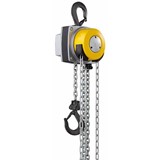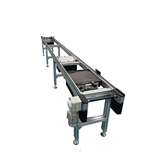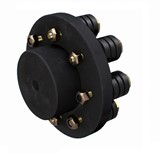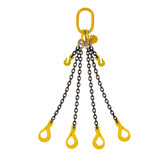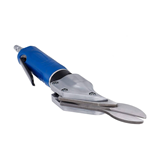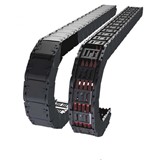"The Australian logistics industry is heavily reliant on Pooling Equipment and the new ALC Guideline is an important step forward for the industry, as it delivers for the first time an industry-wide approach to the use of pallets," said Michael Kilgariff, ALC Managing Director.
"Pallets are a critical link in the supply chain because they enable goods to be moved efficiently and effectively from producer to wholesaler and retailer, removing the need to unpack and repack goods.
Transferring responsibility
"The pooling-equipment system has to work on the transferring of responsibility for pooling equipment as the goods that sit on them move from producer to consumer.
"It is everyone's interests that the system works efficiently and effectively because the cost of damaged and unaccounted for pooling equipment is inevitably borne within the supply chain.
"The key is to be aware, understand, and build an accurate process that follows the goods as they move through the supply chain. This gives rise to a set of responsibilities and expectations on the part of all parties handling pooling equipment, which are set out in the ALC Guideline.
Efficiency of Australian economy
"With the logistics industry accounting for more than eight per cent of GDP, any practice which undermines industry efficiency is not only bad for the sector, it undermines the efficiency of the Australian economy.
"With literally millions of pallets in circulation, there simply must be a nationally consistent and industry wide approach to their use.
Pallet management fundamentals
"The ALC Guideline is based on six pallet management fundamentals and aims to achieve greater standardisation along the entire supply chain based on a common set of understandings.
"The Guideline also articulates the roles and responsibilities of the various players who benefit from their use, including companies which use pallets or have a responsibility for their safe-keeping before their return to pooling equipment companies.
"Having inconsistent, contradictory or generally misunderstood practices and procedures across the industry is in no-one's best interests, as it adds to costs and diverts resources away from an organisation's core business," he said.
In addition to spelling out the roles and responsibilities of all parties, the Guideline also includes a best practice outline, a plain English guide, and dispute resolution advice and procedures.
Supply chain consultation
The document is the result of extensive consultations between a wide range of supply chain participants under the auspices of the ALC Pallet Working Group, which included pallet pooling companies, suppliers, transporters, retailers and other industry bodies, and led by ALC.
ALC will now work with the Transport & Logistics Industry Skills Council to develop an appropriate training package to support widespread industry knowledge and application of the Guideline's best practice principles.
It is recognised that the Guideline may not be fully endorsed by all industry participants and ALC intends to convene another Working Group in the next 12 months to review how the Guideline has performed.
- Suppliers
- New to IndustrySearch? Book a Demo
- Advertise with us
- Login
- Email Marketing
- Buyers
- Get Quotes
- Articles & Ideas
- Login
- Subscribe to newsletter
- My Details
- Get Quotes
- Automation & Control
- Automotive Workshop Equipment
- Cleaning Equipment
- Construction & Heavy Machinery
- Conveyor Systems & Components
- Cranes & Hoists
- Electrical & Power Generation Equipment
- Electronic Components
- Farming & Agriculture
- Food & Beverage Processing
- Forklifts & Attachments
- Hydraulic & Pneumatic Equipment
- Industrial Materials, Tools & Components
- Industrial Pumps
- IT Hardware & Industrial Computing
- IT Software & Applications
- Laboratory Equipment & Instruments
- Manufacturing & Industrial Equipment
- Material Handling & Lifting
- Metalworking & Machining
- Mining Equipment & Machinery
- Packaging & Labelling Machinery
- Pallet Management
- Personal Protective Equipment
- Security & Surveillance
- Test & Measurement
- Transport Equipment
- Trucks & Trailers
- Warehouse Storage & Racking
- Waste & Environmental Management
- Welding Machines & Accessories
- Woodworking & Joinery Machines
- Workplace Equipment
- Workplace Safety Equipment
- Get Quotes
- Automation & Control
- Automotive Workshop Equipment
- Cleaning Equipment
- Construction & Heavy Machinery
- Conveyor Systems & Components
- Cranes & Hoists
- Electrical & Power Generation Equipment
- Electronic Components
- Farming & Agriculture
- Food & Beverage Processing
- Forklifts & Attachments
- Hydraulic & Pneumatic Equipment
- Industrial Materials, Tools & Components
- Industrial Pumps
- IT Hardware & Industrial Computing
- IT Software & Applications
- Laboratory Equipment & Instruments
- Manufacturing & Industrial Equipment
- Material Handling & Lifting
- Metalworking & Machining
- Mining Equipment & Machinery
- Packaging & Labelling Machinery
- Pallet Management
- Personal Protective Equipment
- Security & Surveillance
- Test & Measurement
- Transport Equipment
- Trucks & Trailers
- Warehouse Storage & Racking
- Waste & Environmental Management
- Welding Machines & Accessories
- Woodworking & Joinery Machines
- Workplace Equipment
- Workplace Safety Equipment
Trusted by 1.4 million Australian industrial buyers
Buyers
- Discover products & solutions
- Login
- Subscribe To Newsletter
- Browse All Products
- Read Articles
Suppliers
Advertise
- Promote your products & solutions
- New to IndustrySearch? Book a Demo
- Login / Forgot Password
- Advertise Your Products
- Success Stories
- Email Marketing
- Suppliers
- Advertise with us
- Login
- Email Marketing
- Buyers
- Get Quotes
- Articles & Ideas
- Login
- Subscribe to newsletter
- My Details
Get Quotes
- Automation & Control
- Automotive Workshop Equipment
- Cleaning Equipment
- Construction & Heavy Machinery
- Conveyor Systems & Components
- Cranes & Hoists
- Electrical & Power Generation Equipment
- Electronic Components
- Farming & Agriculture
- Food & Beverage Processing
- Forklifts & Attachments
- Hydraulic & Pneumatic Equipment
- Industrial Materials, Tools & Components
- Industrial Pumps
- IT Hardware & Industrial Computing
- IT Software & Applications
- Laboratory Equipment & Instruments
- Manufacturing & Industrial Equipment
- Material Handling & Lifting
- Metalworking & Machining
- Mining Equipment & Machinery
- Packaging & Labelling Machinery
- Pallet Management
- Personal Protective Equipment
- Security & Surveillance
- Test & Measurement
- Transport Equipment
- Trucks & Trailers
- Warehouse Storage & Racking
- Waste & Environmental Management
- Welding Machines & Accessories
- Woodworking & Joinery Machines
- Workplace Equipment
- Workplace Safety Equipment
Get Quotes
- Automation & Control
- Automotive Workshop Equipment
- Cleaning Equipment
- Construction & Heavy Machinery
- Conveyor Systems & Components
- Cranes & Hoists
- Electrical & Power Generation Equipment
- Electronic Components
- Farming & Agriculture
- Food & Beverage Processing
- Forklifts & Attachments
- Hydraulic & Pneumatic Equipment
- Industrial Materials, Tools & Components
- Industrial Pumps
- IT Hardware & Industrial Computing
- IT Software & Applications
- Laboratory Equipment & Instruments
- Manufacturing & Industrial Equipment
- Material Handling & Lifting
- Metalworking & Machining
- Mining Equipment & Machinery
- Packaging & Labelling Machinery
- Pallet Management
- Personal Protective Equipment
- Security & Surveillance
- Test & Measurement
- Transport Equipment
- Trucks & Trailers
- Warehouse Storage & Racking
- Waste & Environmental Management
- Welding Machines & Accessories
- Woodworking & Joinery Machines
- Workplace Equipment
- Workplace Safety Equipment
Trusted by 1.4 million Australian industrial buyers






